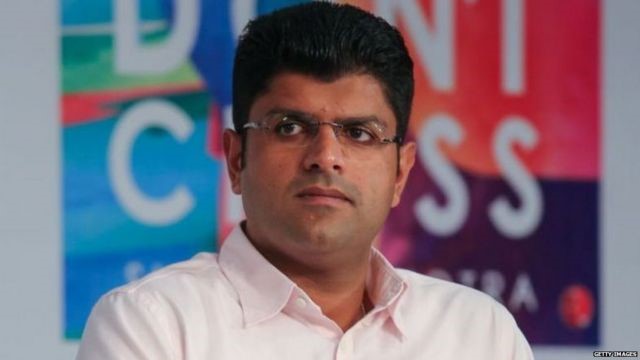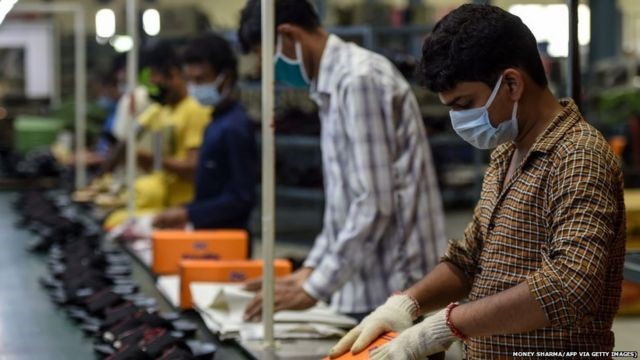Will reservation in private sector in Haryana increase employment or unemployment?
In Haryana, Governor Satyadev Narayan Arya has approved the bill giving 75 percent reservation to the local people in the private sector. This bill was passed in the Legislative Assembly only last year.
Giving information about this, Haryana Deputy Chief Minister Dushyant Chautala said that today is a happy day for the youth of the state. In every company, society, trust, the youth of Haryana will get 75 percent reservation.
Under the Haryana State Local Candidates Employment Bill, 2020, it will be mandatory to recruit local residents of Haryana in 75 percent jobs in a private company or factory located in Haryana. The remaining 25 percent can be recruited from outside the state.
In Haryana, Governor Satyadev Narayan Arya has approved the bill giving 75 percent reservation to the local people in the private sector. This bill was passed in the Legislative Assembly only last year.
Giving information about this, Haryana Deputy Chief Minister Dushyant Chautala said that today is a happy day for the youth of the state. In every company, society, trust, the youth of Haryana will get 75 percent reservation.
Under the Haryana State Local Candidates Employment Bill, 2020, it will be mandatory to recruit local residents of Haryana in 75 percent jobs in a private company or factory located in Haryana. The remaining 25 percent can be recruited from outside the state.

What does the law say
– This law will be applicable to jobs with less than 50 thousand rupees per month salary.
– This rule will be applicable to those companies, societies, trusts, firms operating in the state, which have more than 10 employees. All the companies will have to tell on the portal of the government in 3 months how many posts they have up to 50 thousand salary and how many people working on them are residents of Haryana.
– Companies cannot hire new people till the data is uploaded. It is also in the law that if the company management wants to ban more than 10% of the employees from a district. Every company will have to submit a status report to the government every three months to implement this law.
– Companies not complying with the law will be processed under the provisions of this bill. There may be penalty and the subsidy can be canceled. This law will remain in force for the next 10 years.
– No existing employees working in the private sector will be removed, but the subsequent appointments will be done under this rule.
– An exemption has been given to the company owners that if employees with sufficient experience are not available, then they can give jobs to outsiders but the decision making authority has been given to the District Deputy Commissioner or higher level officer.
– Officers will be able to take data to check the enforcement of the law and can also go to the company premises.
– The officer can accept, reject the application of the company and order the company to train the local candidates for the related skills and qualifications.
There are many big and small industrial units in Haryana. People from outside the state work here, from factories to multinational companies.
Call centers, IT companies, hotels, food processing, automobiles, pharma and textiles, etc. A large number of people from such states like Delhi, UP, Rajasthan and Madhya Pradesh go to work in such companies.
This provision of reservation has been in controversies from the time it came in the manifesto till the formation of the law. From its feasibility, questions have been raised on the legal side.
Also, concerns are being raised about its impact on employees and companies. Experts say that this will not only affect the external workers, but will also affect the business environment in Haryana.
The Haryana government says that this will provide opportunities for the youth of the state to move forward. Cheap labor will reduce the pressure on the state’s resources.
But, if the industrial organizations say that the skilled labor is not available, then outsiders are worried about job opportunities.
Problem of skilled employees in Haryana
On the challenges faced by the companies with the new law, Manmohan Gand, general secretary of the Manesar Industries Welfare Association, says that they will have to grapple with the lack of skilled labor as well as the government machinery.
He says, “The people of Haryana are very hardworking but the problem is that the governments did not make special efforts to develop skills in them. There has been so much industrialization here, but companies do not get the same skilled people in Haryana. People have to be called from outside to meet the same deficiency and those who have skills here get work. ”
They give examples that workers are needed for sewing work here, so workers come from UP, Bihar and Rajasthan. They have been doing this work for many generations. Those people come here and learn the work according to the need within a week, but if we take the local people, then they do not know how to sew. Even if we teach sewing, we will not be able to do such a good job. We will not be able to compete globally.
Similarly, HP Chamber of Commerce and Industry President HP Yadav explains that most of the factories in Haryana are connected with automobiles or textiles. Now those who are the operators of CNC machine or conventional machine in manufacturing of automobiles are not available in Haryana. The youth here are not efficient from this point of view.
He says, “It is the responsibility of the government to teach skills. They have put all the burden on us. 70 percent of the people working here come from outside and 30 percent from Haryana. Now Sarkara is asking us to reverse it. “
Inspector Raj encouraged
Officers have been given powers to monitor that companies follow this law. Along with this, a provision for fine has also been made.
But, the industries have objected that this will increase government intervention and affect the functioning of companies.
Manmohan questions the Gandh government’s promotion of Ease of Doing Business, “This law has created trouble for everyone. Today any institution, an inspector can come and do a big penalty on you. Is this the ease of doing business that the government talks about again and again. In such a situation, the companies will be discouraged and will have to leave from Haryana. ”
“People will be unemployed and our work will be stopped. Like, people of UP and Bihar come here for leather work in winter. They know a very good job of leather harvesting. With the government’s permission, the entire season will come out keeping the workers and we will not be able to complete the order. “
At the same time, HP Yadav says that this will reduce employment rather than increase. The youth of Haryana also will not get opportunities because the companies will go out.
He told, “Companies work in places where working conditions are suitable for them. If companies had to struggle to find labor, they would take their units elsewhere and would not invest in Haryana in the coming time. This will harm the state itself. “
Challenge in court
Industrial organizations are also considering challenging this law.
HP Yadav told that they should have the right to appoint companies. When it was taken in the election manifesto, then we had told the government about its consequences but still nothing happened. Now we are considering challenging it in the Supreme Court.
But, can this law be challenged?
Advocate Virag Gupta in the Supreme Court says that this law can be challenged in the court because this law violates some fundamental rights.
He explains, “According to the Fundamental Rights, there is no system of citizenship of states in India. States cannot impose such a restriction which ends the freedom to move from one place to another, to adopt a profession and to do business. This freedom is prescribed in Article 19 of the Constitution. “
“Talking about equality, under Article 14, you cannot do inequality with people of other states of the country on the basis of not being a resident of the state. At the same time, it does not fit even under the system of reservation. There is no provision for reservation on the basis of birth. “
This is also happening, how will the government decide who is the resident of the state. It will be determined on the basis of birth or education. If someone hails from Haryana but stays outside, he will be considered as Haryana or not. If someone is born in Haryana, but basically belongs to somewhere else, then in which class will they be kept?
Virag Gupta says that such a system damages the federal structure of the country. Instead of one country one law, many states will become many laws.
How difficult to implement
Enforcing this law on companies can also be a challenge. In such a case, legal betting will start between the companies and the government.
Virag Gupta draws attention to some important questions about this-
– The registration of companies and firms is done under the Companies Act which is a central law. Registered offices, functional offices and subsidiaries of companies can have different locations. In this case, how will this law apply to them.
– Faridabad is such an area that comes in both Haryana and NCR, then whether it will apply to the companies or not, it is not clear.
– How can you force the companies that are not getting any help from the government for reservation. If the quality and competitive ability of the private sector is being affected, then the government cannot become an impediment to the profitability of a company.
Concern is also being raised that the new law will promote the culture of contract and freelancing, in which the mill will eventually be crushed by the employees.
Often, many companies keep their employees on contract or work as freelancers, not on payroll. When the number of people in their staff will be less, then they will also have to keep the local people low.
Virag Gupta says that a new kind of deception will begin with the law. In such a situation, the purpose of giving opportunity to the local people will not be fulfilled. This can lead to an exodus of both capital and talent from Haryana.
Give rise to many problems
The trend of moving from one state to another in search of work is all over the country. According to a report published in the Economic and Political Weekly, migrant laborers from Uttar Pradesh and Bihar go the most to other states of the country. Then comes number Madhya Pradesh, Odisha and Jharkhand.
Among the states where they go in search of work, Delhi-NCR and Maharashtra are at the forefront. After this the number comes from Gujarat, Andhra Pradesh, Karnataka and Punjab. If other states also bring similar laws then what will be the situation. However, such a law is already in force in Andhra Pradesh.
Researcher Rakhi Sehgal at Gurgaon Labor Center says that this decision in itself is going to give rise to many problems.
She says, “First of all it can cause inter-state conflicts. If other states like Haryana follow the same rules, what will happen to the people of Haryana working in other states. At the same time, people of those states which do not have industries, will move to other states than Haryana and exploitation will increase only due to increase in the number of workers in employment there. ”
“Actually migration happens when there is not the same development everywhere. Elsewhere, if there are industries, there are no workers and elsewhere there are workers, there is no industry. That is why people have the freedom to go anywhere and employment in a country. “
She says that this decision will increase the difficulties for the migrant workers. Like there was Marathi vs Madrasi in Maharashtra sometime. There is already a feeling of insecurity among the people working in another state. Now they will feel more pressure.
The government says that this step has been taken to reduce unemployment in Haryana. According to a report in Times of India, according to a report by the Center for Monitoring Indian Economy, in April 2020, Haryana was at number five nationwide with 43.2 percent unemployment. But, experts believe that this is not the right cure for the problem.
Rakhi Sehgal says, “Haryana has a problem of unemployment but to overcome it first people have to be skilled for the job.”
“There has been a lack of foresight in governments here. Due to agriculture being the main occupation in Haryana and the sale of land at high prices during industrialization, people were mainly dependent on it for livelihood. Apart from this, most of them kept trying for government jobs. At that time, much attention was not paid to skill development. Then his lifestyle also changed a lot. “
She says that now with the growing of families, farms were gradually divided and could not depend on only the land sold, then there was a need for private jobs as well. But, according to these jobs then you did not have skill. Therefore, instead of implementing reservation, attention should be paid to education and skill development in Haryana.




